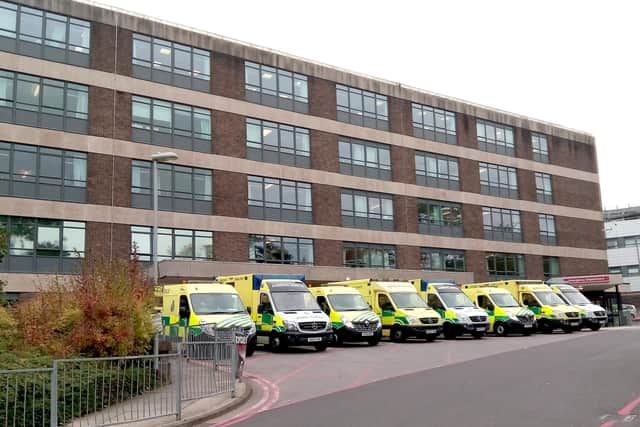Portsmouth among worst hit in England for patients to be handed over from ambulance to A&E staff
and live on Freeview channel 276
A total of 8,401 delays of more than 60 minutes were recorded across all acute trusts in the seven days to December 12, according to NHS England.
This is up slightly from 8,211 in the previous week, and represents 10 per cent of all ambulance arrivals.


Advertisement
Hide AdAdvertisement
Hide AdAnalysis of the figures showed that University Hospitals Birmingham reported the highest number for an individual trust in the week to December 12 (472 delays of more than 60 minutes), followed by Portsmouth Hospitals University (354), University Hospitals of North Midlands (320), Gloucestershire Hospitals (282) and University Hospitals Bristol & Weston (281).
University Hospitals Birmingham also topped the list for delays of at least 30 minutes (957), followed by University Hospitals of North Midlands (563), North West Anglia (488), Portsmouth Hospitals University (465) and Barking, Havering & Redbridge University Hospitals (464).
The figures showed 11,102 patients waited between 30 and 60 minutes to be handed over, down slightly from 11,155 in the week to December 5.
It means nearly a quarter (23 per cent) of all arrivals last week were kept waiting for at least half an hour – the same proportion as the previous week.
Advertisement
Hide AdAdvertisement
Hide AdA handover delay does not always mean a patient has waited in the ambulance. They may have been moved into an A&E department, but staff were not available to complete the handover.
The figures give a snapshot of the pressure hospitals in England are continuing to face heading into the Christmas period, however.
The 8,401 delays of more than 60 minutes in the week to December 12 was nearly twice the number for the equivalent week last year (to December 13 2020).
Just 5 per cent of arrivals in that week had to wait more than 60 minutes for a handover, compared with 10 per cent this year.
Advertisement
Hide AdAdvertisement
Hide AdAnd 15 per cent of arrivals had to wait at least 30 minutes, compared with 23 per cent this year.
Out of 131 acute trusts who had patients in critical care every day last week, five had no spare beds.
Dorset County Hospital, George Eliot Hospital, Portsmouth Hospitals University, Royal United Hospitals Bath and Sherwood Forest Hospitals reported 100 per cent occupancy of all ‘open’ beds each day from December 6 to 12.
The number of A&E diverts last week – when an ambulance is temporarily diverted to another hospital – was 28, three more than the previous week.
Advertisement
Hide AdAdvertisement
Hide AdAt the end of October South Central Ambulance Service reported a critical incident as it was unable to reach many callouts – partly due to call volume but partly because its vehicles were stuck outside hospitals across the region, including at QA.
And in November Scas head of operations Tracy Redman said in a report: ‘Hospital handover delays remain a significant challenge to the Scas service delivery. We have seen the impact of Covid-19 actually reducing the delays, however SCAS has experienced the highest number of delays ever recorded in recent weeks.’
A message from the Editor, Mark Waldron
Subscribe here for unlimited access to all our coverage, including Pompey, for just 26p a day.
Comment Guidelines
National World encourages reader discussion on our stories. User feedback, insights and back-and-forth exchanges add a rich layer of context to reporting. Please review our Community Guidelines before commenting.
